Tesla speeding up European plant: Rumors are floating that Tesla may be able to beat the timing on its second plant opening in China with its Berlin vehicle manufacturing facility. Some of those working on the German plant are bragging they are three months ahead of where the Chinese plant was at this time last year. You can also view a video on 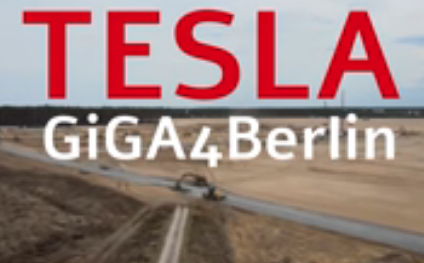 the plant’s construction, with the nickname of GiGA4Berlin. Tesla continues to work quickly through the COVID-19 crisis and inner turmoil over management turnovers. One theory is that CEO Elon Musk and team are learning big lessons from crafting two vehicle plants and one battery factory to produce four models to production scale (with the fifth, the Model Y, slowed down for now with some production issues). That lesson would be how to standardize building the production plants and speeding everything up. Tesla is on its way to become a true global automaker serving the biggest markets: North America, China, and Europe.
the plant’s construction, with the nickname of GiGA4Berlin. Tesla continues to work quickly through the COVID-19 crisis and inner turmoil over management turnovers. One theory is that CEO Elon Musk and team are learning big lessons from crafting two vehicle plants and one battery factory to produce four models to production scale (with the fifth, the Model Y, slowed down for now with some production issues). That lesson would be how to standardize building the production plants and speeding everything up. Tesla is on its way to become a true global automaker serving the biggest markets: North America, China, and Europe.
Automotive Digest going away, welcoming new media platform: Automotive Digest will soon be closed down for good, sad to say. But Chuck Parker will be staying in the game, having recently launched his Fixes and Solutions new media content platform. His new title describes it well: Editor, Publisher, Strategist, & Fixer. The focus here is on identifying and exploring the problems, issues, and obstacles along with possible fixes and solutions that are shaping the country, society, and the world — and not just the automotive industry. It’s also a good space for experts/analysts to voice their concerns, as editorial contributions are being accepted.
What does that look like? A few topics featured in its published articles tell the story…….. How robotics startup Starship Technologies is making its way through COVID-19 and building up its fleet of autonomous sidewalk delivery vehicles……… Federal courts are starting to protect laws that the Trump administration has been dismantling over fossil fuels’ impact on the climate…………. Can leaders from the US and Europe seize the moment to take on the challenges of stopping pandemics, solving climate change, and dealing with inequities of race and economies?…….. How online therapy app, Talkspace, has given counselors, therapists, and medical professionals a new functional means to delivering therapy without being in the same room or office with the client……. and much more.
China investing heavily in coal power: China is in the process of undercutting all the capital and resources invested in clean energy and electric vehicles. The country permitted more new coal-fired power plants in March than it did in all of 2019. It comes right after a surge in coal plant construction last year. China already consumes more than half of the world’s coal. The country has almost as much new coal generation in planning or construction (206 gigawatts) as the US has in operation (235 GW at the end of 2019). It came from the economic turmoil the country started experiencing a decade ago, with the government putting investing huge sums through state-owned enterprises, with much of it going into coal-fired power.
Zobel heading hydrogen council: The California Hydrogen Business Council (CHBC) has named Bill Zobel, a prominent figure in natural gas vehicles, as the executive director of the organization. Zobel joins CHBC after over ten years at Trillium, where he served as vice president of business development and marketing. During those years, Zobel helped to diversify the company’s alternative fuel portfolio to include hydrogen refueling in order to meet changing market conditions, customer needs, and company goals. He also worked to secure two premier hydrogen projects in the transit sector with the Orange County Transportation Authority and Champagne-Urbana Mass Transit District.
Clean Transportation group looking for active members: If you’re a LinkedIn member, come by the Clean Transportation group. I’d started it a few years ago, but let it go dormant. Like other LinkedIn groups, it’s a good platform for telling the story on projects you’re working on, and critical issues facing the future of clean transportation, alternative fuels, and the future of transportation. Another one to check out is Sustainability Working Group, which delves into how sustainability is embedded in organizations and the impact this has on environmental stewardship, stakeholder well-being, community development and shared value. And one more thing, check out my article published in LinkedIn, “What’s the state of the economy as the ‘new normal’ drags on?”
Hyundai and Kia tapping into heat pump EV efficiency: Hyundai Motor Company and Kia Motors Corporation released details of their innovative heat pump system, deployed in Hyundai and Kia’s global electric vehicle (EV) line-up to maximize their all-electric driving range in low temperatures. It’s extending per-charge driving range by tapping into waste heat to warm the cabin for passengers traveling through cold weather. It was first tied out in the first-generation Kia Soul EV, which used its compressor, evaporator, and condenser, so that the heat pump was able to capture waste heat given off by the vehicle’s electrical components, recycling this energy to heat the cabin more efficiently.

 Musk would like to see the company’s Fremont, Calif., factory opened again. A government-ordered shutdown kicked in on March 24 with Covid-19 quarantine orders in effect at least until May 31. Musk told shareholders he didn’t know when Tesla could resume production in California and called the state stay-at-home order a “serious risk” to the business.
Musk would like to see the company’s Fremont, Calif., factory opened again. A government-ordered shutdown kicked in on March 24 with Covid-19 quarantine orders in effect at least until May 31. Musk told shareholders he didn’t know when Tesla could resume production in California and called the state stay-at-home order a “serious risk” to the business.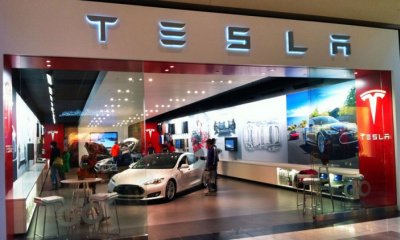 federal judge overseeing the case. The settlement means that CEO Elon Musk will be stepping down as chairman for three years, and that two new independent directors will be appointed to the board. Musk will be paying $20 million, and Tesla will pay another $20 million, in fines distributed to harmed investors. Musk’s insulting tweet last week on Thursday, mentioning that the SEC is changing its name to “Shortseller Enrichment Commission.”
federal judge overseeing the case. The settlement means that CEO Elon Musk will be stepping down as chairman for three years, and that two new independent directors will be appointed to the board. Musk will be paying $20 million, and Tesla will pay another $20 million, in fines distributed to harmed investors. Musk’s insulting tweet last week on Thursday, mentioning that the SEC is changing its name to “Shortseller Enrichment Commission.” that the company’s market valuation will be more than 10 times larger than it is today. The company announced that it has started a 10-year CEO performance package based entirely on the automaker’s market cap growing from the current level of $50 billion to more than $650 billion over the next decade. A similar program had been enacted in 2012, with Musk more than hitting the mark.
that the company’s market valuation will be more than 10 times larger than it is today. The company announced that it has started a 10-year CEO performance package based entirely on the automaker’s market cap growing from the current level of $50 billion to more than $650 billion over the next decade. A similar program had been enacted in 2012, with Musk more than hitting the mark. 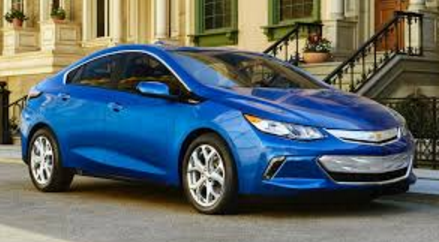 vehicles like the Chevrolet Bolt.
vehicles like the Chevrolet Bolt. 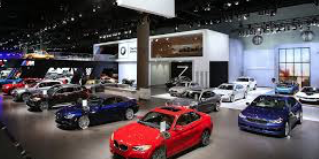 revised strategy being tried out at auto shows is having on car shopping. Events such as the LA Auto Show have been less about the wonders of far-out advanced technology, and more about bringing to life the innovations found in today’s vehicles. Learning more about the new vehicles and their capabilities goes far beyond those visiting the showrooms, with millions of consumers gaining digital access to the car shows online. Cars are coming equipped with interactive systems like Apple’s Siri and Amazon’s Alexa that allow for verbal commands and touch screens simplifying the process — and getting car owners to see new possibilities coming through the technology. Connected car systems are expected to be the gateway to fully autonomous vehicles coming to roads over the next decade. Today, drivers can tap into mobility functions to manage charging their electric vehicle through voice commands, and to find out about available public charging spots.
revised strategy being tried out at auto shows is having on car shopping. Events such as the LA Auto Show have been less about the wonders of far-out advanced technology, and more about bringing to life the innovations found in today’s vehicles. Learning more about the new vehicles and their capabilities goes far beyond those visiting the showrooms, with millions of consumers gaining digital access to the car shows online. Cars are coming equipped with interactive systems like Apple’s Siri and Amazon’s Alexa that allow for verbal commands and touch screens simplifying the process — and getting car owners to see new possibilities coming through the technology. Connected car systems are expected to be the gateway to fully autonomous vehicles coming to roads over the next decade. Today, drivers can tap into mobility functions to manage charging their electric vehicle through voice commands, and to find out about available public charging spots.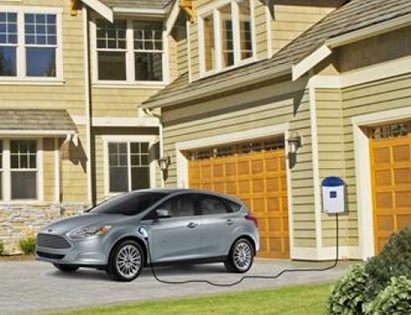 will still be able to claim a tax credit up to $7,500 on the purchase. The 200,000 unit cap will still be in place with Tesla, General Motors, and Nissan expected to hit that ceiling sometime next year. Automakers and organizations such as CALSTART and Plug In America had been lobbying for inclusion of the tax credit, which had been initially cut from a House tax bill.
will still be able to claim a tax credit up to $7,500 on the purchase. The 200,000 unit cap will still be in place with Tesla, General Motors, and Nissan expected to hit that ceiling sometime next year. Automakers and organizations such as CALSTART and Plug In America had been lobbying for inclusion of the tax credit, which had been initially cut from a House tax bill.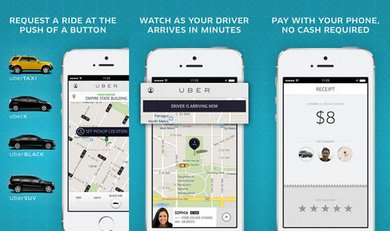 had argued that it merely provides a mobile app linking riders to car owners, and not a taxi or livery company. The case had come out after Barcelona ruled that Uber was to obey local taxi rules in that city. Uber downplayed the court ruling, saying that the company already operates under transportation laws in most European Union countries. Analysts say the ruling will have serious implications for Uber and other similar companies operating in the new gig economy. Uber and its new management team have a set of challenges to face after going through a difficult year.
had argued that it merely provides a mobile app linking riders to car owners, and not a taxi or livery company. The case had come out after Barcelona ruled that Uber was to obey local taxi rules in that city. Uber downplayed the court ruling, saying that the company already operates under transportation laws in most European Union countries. Analysts say the ruling will have serious implications for Uber and other similar companies operating in the new gig economy. Uber and its new management team have a set of challenges to face after going through a difficult year.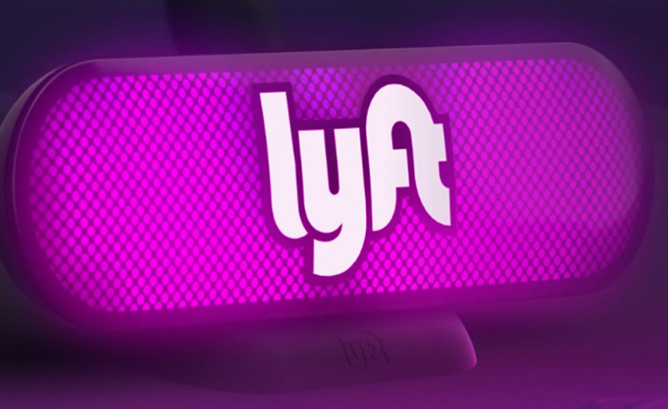 Fidelity Management & Research Company and Ontario Teachers’ Pension Plan. AllianceBernstein, Baillie Gifford, KKR, Janus Henderson Investors, and Rakuten. CapitalG led the billon-dollar round. The ride-hailing firm’s valuation is now at $11.5 billion. Alphabet, the Google parent company, played a key role in bringing in more investors for Lyft during October – after pulling away from financial support for arch-competitor Uber and filing its intellectual property theft lawsuit affecting its Waymo division……………..
Fidelity Management & Research Company and Ontario Teachers’ Pension Plan. AllianceBernstein, Baillie Gifford, KKR, Janus Henderson Investors, and Rakuten. CapitalG led the billon-dollar round. The ride-hailing firm’s valuation is now at $11.5 billion. Alphabet, the Google parent company, played a key role in bringing in more investors for Lyft during October – after pulling away from financial support for arch-competitor Uber and filing its intellectual property theft lawsuit affecting its Waymo division……………..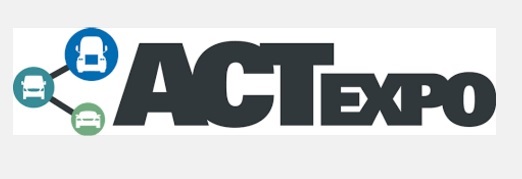 clean transportation events, GNA has played a key role in raising millions of dollars in grant funding for clients during its history. The consulting firm will celebrate its 25 year anniversary next year. The company has effectively supported the use of renewable fuels, and has provided research and analysis for all parts of the clean transportation industry. GNA also does emissions modeling, assists with technical fleet planning, monitors government affairs, and provide communications and media services to clients, CNGVC said.
clean transportation events, GNA has played a key role in raising millions of dollars in grant funding for clients during its history. The consulting firm will celebrate its 25 year anniversary next year. The company has effectively supported the use of renewable fuels, and has provided research and analysis for all parts of the clean transportation industry. GNA also does emissions modeling, assists with technical fleet planning, monitors government affairs, and provide communications and media services to clients, CNGVC said.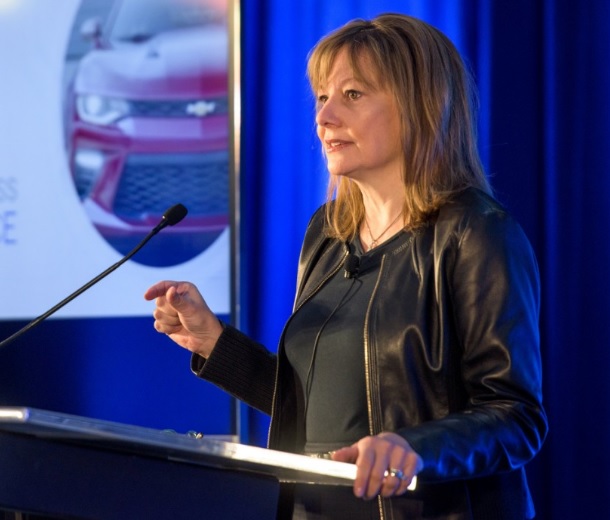 making profits building and selling electric vehicles. General Motors CEO Mary Barra yesterday told investors at the Barclays Global Automotive Conference in New York that the company in 2021 will be launching a new, flexible platform for electric vehicle launches that will bring down costs and increase profits. The new EV platform will accommodate multiple sizes and segments, to be sold by different GM brands in the U.S. and China, she said. A new battery system will bring down costs 30% cheaper than the battery pack used in the Chevy Bolt, Barra said. The automaker will be building at least one million EVs a year by 2026, with most going into China to comply with new energy vehicle regulations. Last month, GM said it planned to launch 20 new electric vehicles by 2023, but did not provide details…………
making profits building and selling electric vehicles. General Motors CEO Mary Barra yesterday told investors at the Barclays Global Automotive Conference in New York that the company in 2021 will be launching a new, flexible platform for electric vehicle launches that will bring down costs and increase profits. The new EV platform will accommodate multiple sizes and segments, to be sold by different GM brands in the U.S. and China, she said. A new battery system will bring down costs 30% cheaper than the battery pack used in the Chevy Bolt, Barra said. The automaker will be building at least one million EVs a year by 2026, with most going into China to comply with new energy vehicle regulations. Last month, GM said it planned to launch 20 new electric vehicles by 2023, but did not provide details…………  recognized more than Warren Buffet, Jeff Bezos, Mark Zuckerberg, and Richard Branson combined. He’s been on the cover of
recognized more than Warren Buffet, Jeff Bezos, Mark Zuckerberg, and Richard Branson combined. He’s been on the cover of 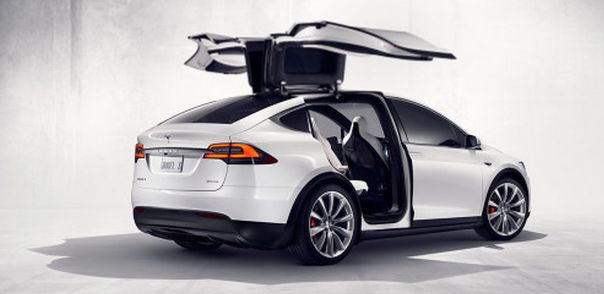 Oct. 28, 2016, and Sept. 1, 2017 with a second row seat that folds down flat, Tesla will be correcting an error that could mean the second row seats would move forward in a crash. The problem stems from incorrectly adjusted seat cables and was discovered through internal testing. It only affects about 3% of those vehicles. The electric automaker is taking on the voluntary recall through a 10-minute procedure done by mobile service operators. The company hasn’t received reports of any issues or accidents related to the problem; customers were to be alerted starting yesterday.
Oct. 28, 2016, and Sept. 1, 2017 with a second row seat that folds down flat, Tesla will be correcting an error that could mean the second row seats would move forward in a crash. The problem stems from incorrectly adjusted seat cables and was discovered through internal testing. It only affects about 3% of those vehicles. The electric automaker is taking on the voluntary recall through a 10-minute procedure done by mobile service operators. The company hasn’t received reports of any issues or accidents related to the problem; customers were to be alerted starting yesterday.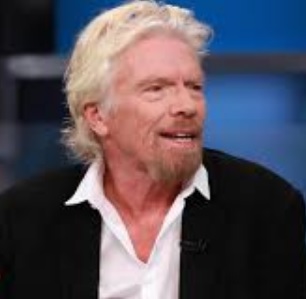 company announced Thursday it will be renamed Virgin Hyperloop One, and it followed a significant but undisclosed investment by the Virgin Group founder. Based in downtown Los Angeles, Hyperloop One comes from a concept released a few years ago by Tesla and SpaceX CEO Elon Musk. The transport system will carry passengers and cargo in pods through tubes at speeds of more than 250 miles per hour; and that could eventually go as high as 750 miles per hour. The company has been testing its pods in Nevada. Branson’s Virgin Galactic has been setting up office space in Southern California and will be directly competing with SpaceX in the space transport business.
company announced Thursday it will be renamed Virgin Hyperloop One, and it followed a significant but undisclosed investment by the Virgin Group founder. Based in downtown Los Angeles, Hyperloop One comes from a concept released a few years ago by Tesla and SpaceX CEO Elon Musk. The transport system will carry passengers and cargo in pods through tubes at speeds of more than 250 miles per hour; and that could eventually go as high as 750 miles per hour. The company has been testing its pods in Nevada. Branson’s Virgin Galactic has been setting up office space in Southern California and will be directly competing with SpaceX in the space transport business.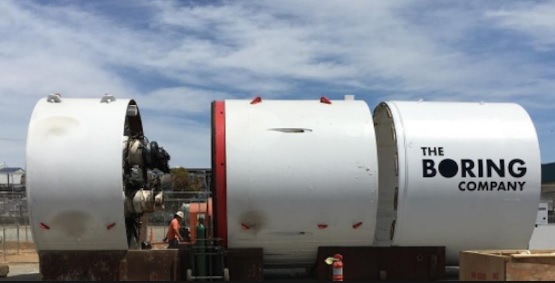 Washington, D.C. “Just received verbal govt approval for The Boring Company to build an underground NY-Phil-Balt-DC Hyperloop. NY-DC in 29 mins,” he tweeted yesterday. He later tweeted out that formal approval with the Trump administration is still needed, but after discussions they’ve had, he’s confident the project will be able to move forward. That could bring fast Hyperloop-like trains to Los Angeles and important transport routes on the east coast.
Washington, D.C. “Just received verbal govt approval for The Boring Company to build an underground NY-Phil-Balt-DC Hyperloop. NY-DC in 29 mins,” he tweeted yesterday. He later tweeted out that formal approval with the Trump administration is still needed, but after discussions they’ve had, he’s confident the project will be able to move forward. That could bring fast Hyperloop-like trains to Los Angeles and important transport routes on the east coast. Automobiles division is concerned that most U.S. consumers will be confused or concerned about having to charge for the first time and be subject to range anxiety. Plugging in is less of a worry in California, which has made up about half of U.S. plug-in vehicle sales. Still, it is possible to occasionally see Chrysler billboard ads in the state that only identify the Pacifica as a hybrid.
Automobiles division is concerned that most U.S. consumers will be confused or concerned about having to charge for the first time and be subject to range anxiety. Plugging in is less of a worry in California, which has made up about half of U.S. plug-in vehicle sales. Still, it is possible to occasionally see Chrysler billboard ads in the state that only identify the Pacifica as a hybrid.